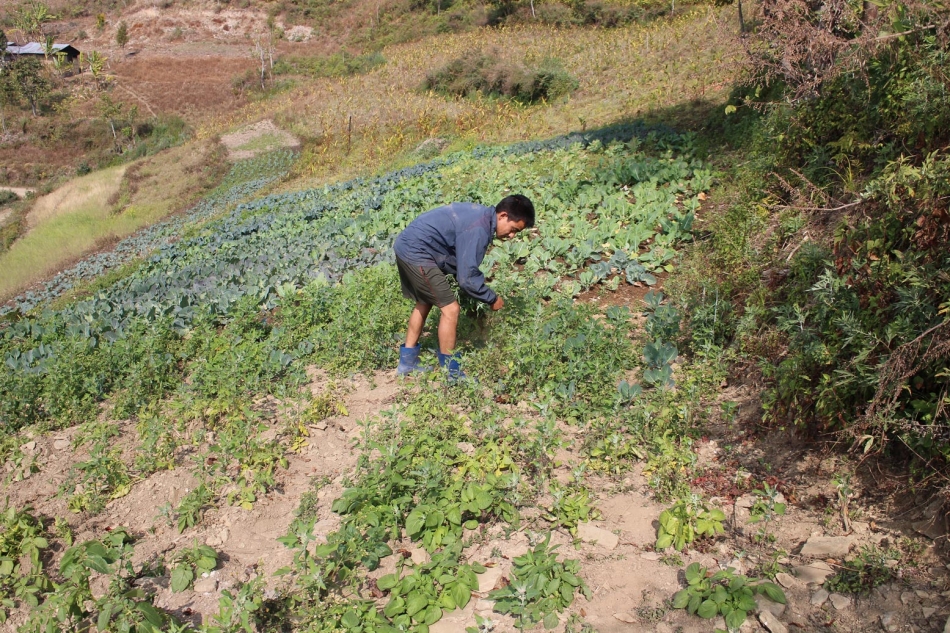
Young people in Bhutan now find new careers in agriculture after COVID-19. One of these youngsters is Tek Bahadur Wakley. He had grown up with his parents as farmers, but he wanted a different life from the back-breaking work he saw his parents do.
Tek considered himself a person of the city. He had left his farm, not wanting the back-breaking job he believed it to be, to go work in tourism. He worked with a tourism company in the city of Paro in the western part of Bhutan and earned a decent salary that provided for his family’s needs until the COVID-19 pandemic struck.
When the COVID-19 pandemic struck, he lost his job in the city and went back to his birthplace in Dagana dzongkhag, a district in central Bhutan.
It was then that Tek, like many other young people, found refuge in agriculture. Some of them were supported by the government in getting state land on lease for agriculture. For others, like Tek who had family land, this was an opportunity to return to their villages.
“The land in my village was being used by my father. However, now that he is old, he could not fully utilize the land and most of it was left uncultivated,” said the 27-year-old Tek. “I thought this was an opportunity for me to capitalize on.”
However, without any prior experience in agriculture and farming, Tek was not sure how he could earn a decent living from agriculture. “While commercial agriculture for me at that moment was out of the question, I wanted to put to use all the land we had.”

He ventured into farming with the support of the Food Security and Agriculture Productivity Project (FSAPP), funded by the Global Agriculture and Food Security Programme. With World Bank as the project’s supervising entity, the Food and Agriculture Organization of the United Nations (FAO) provides technical assistance and capacity building to Bhutan’s Department of Agriculture, which implements the project. The aim of the FSAPP project is to help farmers leverage climate-smart agricultural interventions to alleviate rural poverty, reduce food insecurity and combat malnutrition.
The project began by assessing the needs of these young agripreneurs in Dagana. Providing technical support to the project, FAO trained extension agents and researchers at the Bajo branch of Bhutan’s Agriculture Research and Development Centre (ARDC) in climate-smart technologies that help farmers, youth and agricultural entrepreneurs in practising sustainable agriculture. The climate-smart technologies included the preparation of organic fertilizer and the introduction to hydroponics.
Organic fertilizer helps boost soil fertility, increase carbon sequestration, reduce greenhouse gas emissions and bolster the soil’s ability to withstand drought or flooding. “Because it is organic, there are no side effects to the soil or the crops that are grown in it,” said Tek.
Then the ARDC Bajo, in collaboration with the district’s agriculture sector, passed on the training they received from FAO to the youth. Tek and eight other young people partook in the first batch of training in 2021.
While, on average, each youth owns more than 2.5 acres of land, most farmers only produce food for their own subsistence. Either because of a lack of manpower, little knowledge of or access to farm mechanisation or limited markets for the produce, not many farmers in Bhutan engage in commercial farming. After the training, however, Tek and many other farmers showed interest in this.
With new skills in agriculture and related technologies, these youth returned to their farms to turn their knowledge into practice. FSAPP additionally supported them with farming equipment like a greenhouse, a bio-digester, equipment for mushroom cultivation and a power tiller. Tek received a mini-power tiller, a basic greenhouse, a drip irrigation set and mulch throughout the project.
“The mini tiller has made our work much easier, and the greenhouse is helpful in growing crops during the off-season,” said Tek. “This has also reduced labour costs.”
Today Tek grows a variety of crops, but he intends to focus on winter chillies and cauliflower. “During the first year after the support I grew some 80 kilograms of chillies and more than 600 kilograms of cauliflower. These two commodities have good demand in the market, especially during winter,” he said. Tek has increased his income by almost 30 per cent in the last two years and plans to take up commercial farming focusing on the two commodities.
He believes that farming has drastically changed. “You no longer have to struggle in the sun and rain to grow crops. New technologies and mechanization have made farming much easier,” he said. “The last two years have been challenging but at the same time, it has been more rewarding. I plan to continue being a farmer.”
Content with rural living, Tek has no plans to move back to urban areas.
“Back then when I was a tour guide, life was good too. However, the contentment of working as a farmer is on another level. I’m not only able to support my family but also contribute to my community through the supply of fresh vegetables.”
To date, FAO has trained over 30 extension agents and agriculture officials under the FSAPP project. This training has been extended to more than 1 000 farmers including 60 young people in Dagana district through ARDC Bajo training programmes.
By increasing agricultural productivity and improving farmers’ access to both local and export markets, the FSAPP project is strengthening food and nutrition security in a total of five districts of Bhutan, FAO said.
Source: the FAO News and Media office, Rome
– global bihari bureau




